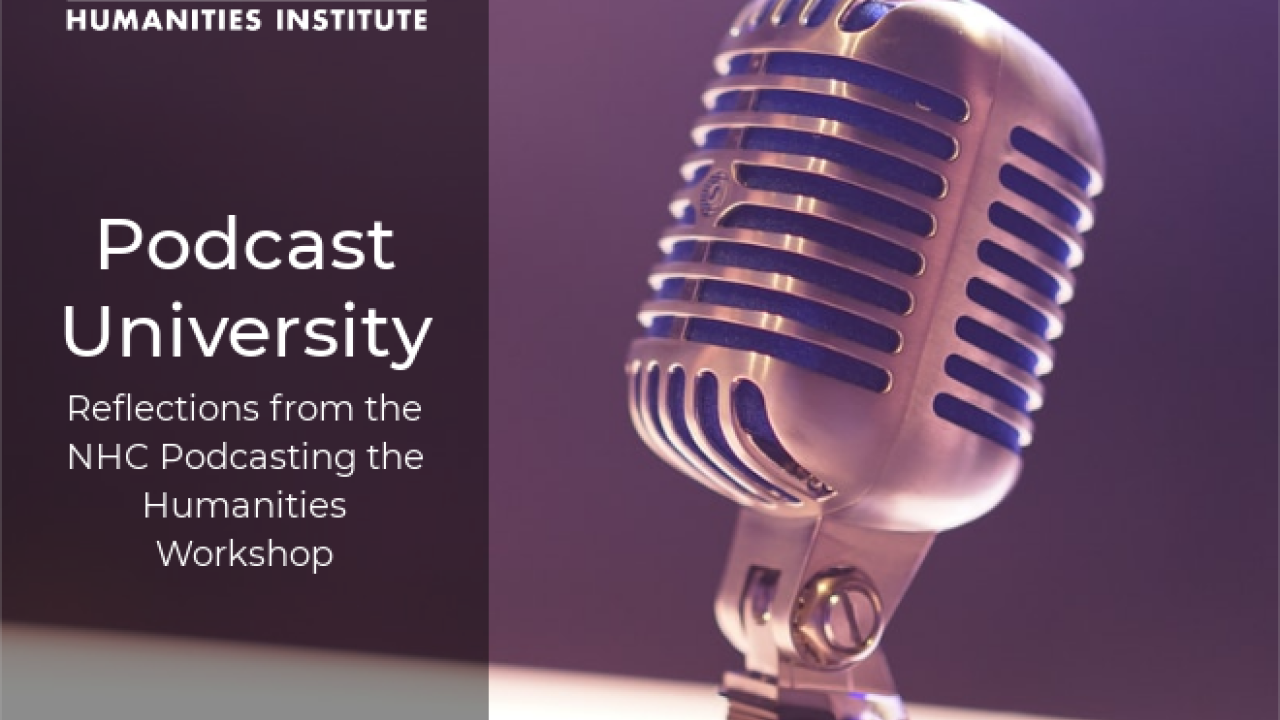
Podcast University - Reflections on the NHC Podcasting the Humanities Institute 2022
Welcome to Podcast University, a new series highlighting podcasting projects by UC Davis graduate students, faculty, and staff. For our first installment, we hear from Emily Rich, who was one of nine graduate students who received a DHI grant to attend the National Humanities Center Podcasting the Humanities Institute.
The Podcasting the Humanities Institute, a partnership between the National Humanities Center and the Digital Humanities Center at San Diego State University, was a five-day virtual residency that provided a crash course in using podcasts as a tool for publicly engaged scholarship. This year’s Institute took place January 10-14, 2022, and I was one of nine UC Davis graduate students to attend. In this article, I’ll share an inside perspective on what the Institute was like as well as my own personal takeaways from the experience.
The Institute’s core emphasis is the collaborative process of podcast creation—attendees are separated into groups of four, and each group is tasked with producing a short podcast episode by the end of the week. But while learning through experimentation is crucial to the Institute’s pedagogical approach, attendees are not left without guidance. Instead, there is a network of support and encouragement that provides scaffolding for the podcasting project. We attended multiple plenary panels on podcasting and public scholarship, including talks and Q&As with established academic podcasters and presentations from former Institute attendees who had gone on to produce podcasts. The institute also offered around-the-clock tech support, and we attended multiple tech sessions introducing us to everything from the basics of recording and audio editing, to where to find music and sound effects, to how to make a podcast available on streaming services. In addition to these synchronous sessions, each group had a dedicated support person there to answer questions and provide encouragement.
All of the programming and support structures were there to facilitate each group’s creative process, and for me the most generative part of the Institute was the time I spent working with my cohort. Because the cohorts are made up of people from different disciples and institutions, each member brought different interests, knowledge bases, and methodologies to the table. The facilitators of the institute repeatedly reminded us to “find the conversation that only you can have,” the unique perspective that could only come from our cohort. This meant slowing down, having organic conversations, and believing that something compelling would arise if we allowed ourselves to trust the process. My peers’ creativity and excitement inspired me to try things that I would not have otherwise pursued, and the podcast episode we created— a meditation on loss, repair, and replacement— is unlike any other scholarly project I have been a part of.
Creating an entire podcast episode from the ground up in one week might seem like an impossible task, but the structured nature of the Institute actually made my first foray into podcast production feel much less overwhelming than I expected. Because I was focused on a series of small, concrete goals like adding music to an introduction or splicing together parts of a conversation, I could focus on learning the skills I needed for each task without getting lost in a sea of complicated audio editing tutorials. Working in a small group made this even more manageable because we could divide the work between us, and knowing that I was accountable to my cohort at the end encouraged me to produce my best work.
Given the ever-increasing demands of research and teaching, it is easy for us to put off public-facing work or treat it as a mere side project. For me, one of the most important aspects of the Podcasting Institute was the opportunity to spend a week putting public scholarship front and center, treating it not as a distraction but as a priority, with people who understood the value of public-facing, non-standard forms of academic knowledge creation and dissemination.
You can find examples of podcasts created at the 2022 Institute here, including some by UC Davis graduate students.
Have you ever thought about starting a podcast, or are you curious about their potential for public scholarship? PhD Unlimited is hosting two winter podcasting events to get you started on your podcasting journey. The first, on Jan. 25, will feature a Zoom panel discussion with Podcasting Institute attendees. The second, on Feb. 22, will be an in-person, hands-on podcasting workshop where you can familiarize yourself with the DHI’s podcasting equipment, workshop your ideas with facilitators and other attendees, and craft a production plan for your podcast. And don’t forget to stay tuned for the next installment of the Podcast University: Sounding Stories from Across the Humanities!
